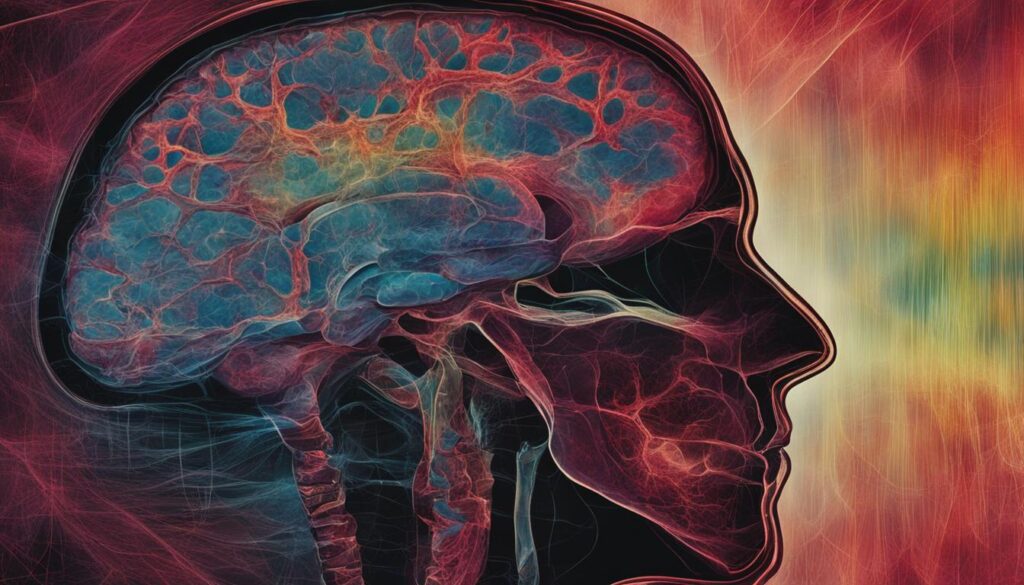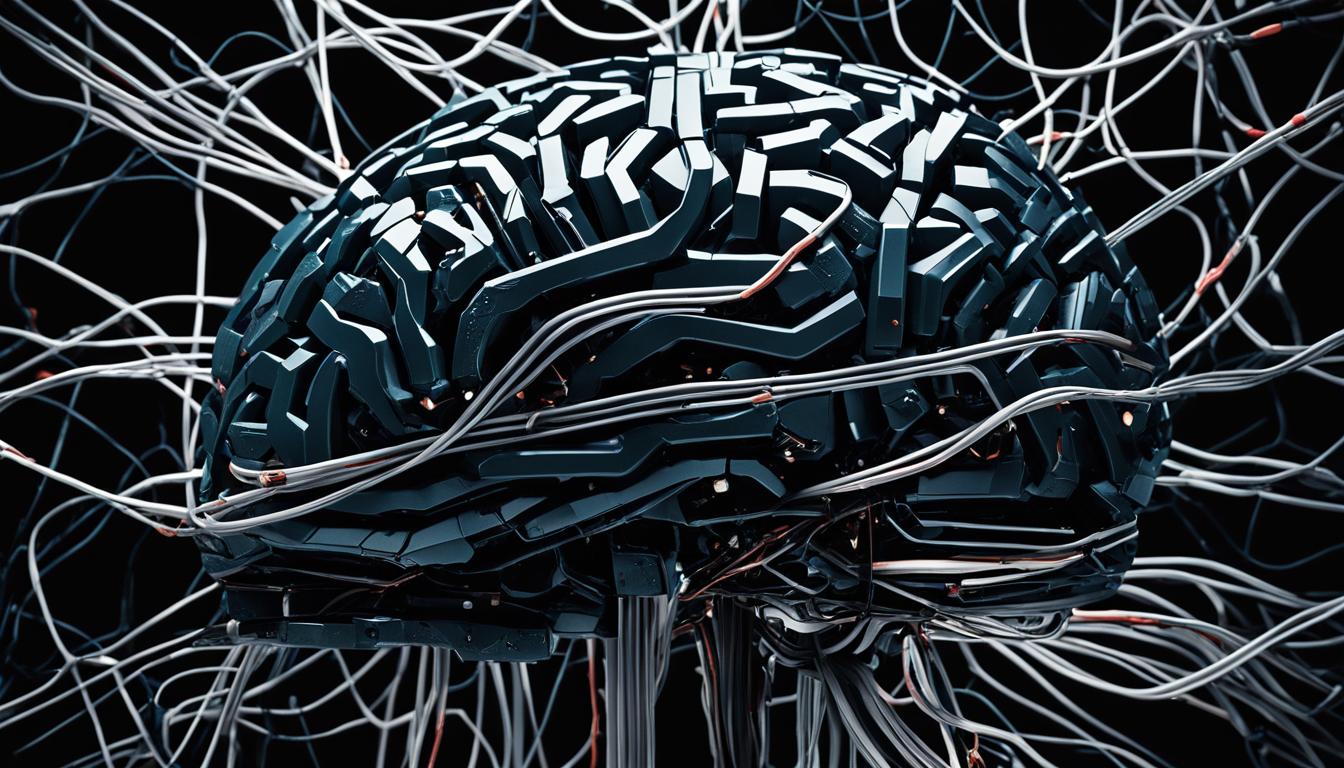Negative effects of masturbation to the brain has been an often-overlooked topic and we are going to explore it in-depth here. While masturbation is often seen as a normal and healthy sexual behaviour due to a lack of information & education, there are potential consequences that are worth understanding. In this article, we will delve into masturbation effects on the brain , the chemical composition of semen, and the cognitive and mental health implications. Let’s get started on this important conversation.
Key Takeaways:
- Continence, or abstaining from sexual activity, is considered beneficial and can contribute to overall brain health.
- Excessive masturbation can deplete vital substances necessary for the nutrition of nervous tissues, leading to brain function disturbances.
- Excessive and frequent masturbation can potentially lead to psychological distress, depression, and addiction-like symptoms.
- Education and open communication are crucial in addressing the potential risks and consequences of masturbation.
The Chemical Composition and Nervous System – Negative Effects Of Masturbation to The Brain
Semen, the fluid released during ejaculation, has a chemical composition that is similar to the central nervous system. It is rich in substances like lecithin, cholesterol, phosphorus compounds, and sex hormones, which are essential for the nutrition of nervous tissues.
These valuable substances play a crucial role in maintaining optimal brain health and function. However, masturbation and the loss of semen can deplete these substances, leading to disturbances in brain functioning. The resorption of semen, whether in the female genital tract or within the male body, can have a vitalizing effect on the nervous system.
Excessive and frequent masturbation, on the other hand, can exhaust the nervous system and potentially lead to chronic nerve weakness. Continence, the practice of abstaining from sexual activity, is beneficial for brain health as it helps in conserving these vital substances.
By understanding the negative effects of masturbation to the brain and the impact of masturbation on the overall brain health, we can make informed choices about continence and prioritize our overall well-being.
Continence and Brain Function – Negative Effects Of Masturbation To The Brain
The cognitive implications of masturbation and its impact on brain function have long been a subject of debate. Contrary to popular belief, continence, or voluntary restraint from sexual activity, has been found to have positive effects on the brain.
Throughout history, many renowned intellectual geniuses, such as Pythagoras, Plato, Aristotle, Leonardo da Vinci, and Beethoven, practised continence as part of their disciplined lifestyles. This indicates a possible connection between continence and enhanced cognitive abilities.
The conservation of lecithin, a vital component present in retained semen, is considered a true brain food. Lecithin provides nourishment to the nervous system, promoting optimal brain function. By abstaining from ejaculation, individuals can ensure the preservation of essential nutrients that support cognitive health.
Leading experts in various fields, including physiology, neurology, psychiatry, and endocrinology, endorse the physiological value of continence. They agree that practising continence is conducive to overall health and does not lead to any harmful consequences.
The Role of Lecithin in Brain Health
Lecithin, abundantly found in semen, is a phospholipid compound that plays a crucial role in brain health. It is involved in the formation of cell membranes and aids in the transmission of nerve signals. Additionally, lecithin is a precursor to acetylcholine, a neurotransmitter that supports cognitive functions such as memory and learning.
“The conservation of lecithin through continence is like providing the brain with a valuable source of nourishment. It helps maintain optimal brain function and supports cognitive processes.”
Scientific studies have shown that excessive ejaculation can deplete lecithin levels in the body, potentially affecting brain health. Continence, on the other hand, allows for the accumulation of vital substances like lecithin, ensuring the brain receives the necessary nutrients for optimal functioning.
Important Q & A about Negative Effects of Masturbation to the brain
In his work, “Gnostic Ontology,” Oscar Uzcategui, the contemporary writer and director of AGEAC, provides a perspective on masturbation when questioned:
Q: Regarding masturbation, sexual education classes often portray it as healthy and necessary. What are the Gnostic views on this?
A: Well, ‘the road to Hell is paved with good intentions.’ Many asylums are filled with individuals who, by abusing sexuality through masturbation, have damaged their nervous systems. Masturbation can lead to long-term issues like premature ejaculation in men, as it conditions their sexual response to self-produced mental images. When faced with a normal sexual relationship, they struggle to maintain an erection, causing strain in marriages, dissatisfaction, and infidelity. In some cases, habitual masturbators may become impotent, damaging neural pathways in the brain. Besides physical consequences, masturbation also inflicts psychological damage on young individuals, contributing to personality disorders, lack of willpower, shyness, and melancholy. At times, masturbation is referred to as a solitary vice due to its detrimental effects.
The Power of Continence: Endorsed by Experts
Experts in the fields of physiology, neurology, psychiatry, and endocrinology have extensively studied the cognitive implications of continence. Their collective consensus is that continence can benefit brain function and overall well-being.
By adopting a continent lifestyle, individuals can experience improved concentration, enhanced creativity, and increased mental clarity. Continence is believed to optimize the utilization of brain resources, allowing individuals to direct their energies towards intellectual pursuits.
The positive effects of continence on brain health are further supported by the experiences of many notable individuals throughout history. These intellectual geniuses who practised continence exemplify the potential cognitive advantages that can be achieved through voluntary sexual restraint.
Incorporating Continent Practices
While continence is often associated with strict abstinence, it can be practised in a more balanced and sustainable manner. Moderation is key, and individuals should aim to find a healthy middle ground that suits their individual needs and desires.
It’s essential to prioritize open and informed discussions about the cognitive implications of masturbation, providing accurate information and dispelling any myths or misconceptions. By understanding the potential benefits of continence on brain function, individuals can gain educated control over their sexual practices.

| Benefits of Continence | How it Supports Brain Function |
|---|---|
| Promotes optimal brain health | Preserves essential nutrients like lecithin |
| Enhances cognitive abilities | Optimizes brain resource utilization |
| Improves concentration and mental clarity | Fosters enhanced creativity |
Masturbation and Mental Health – Negative Effects of Masturbation to the brain
While masturbation itself is not inherently considered harmful due to a lack of information & education, excessive masturbation can have detrimental effects on mental health. Research suggests that individuals who excessively masturbate may experience a range of mental consequences, including psychological distress, guilt, depression, and negative economic and interpersonal consequences. It is important to note that the development and maintenance of certain paraphilias, which are associated with significant distress and impairment in social and occupational functioning, can be influenced by masturbation. “Excessive masturbation can lead to psychological distress and guilt that can have a detrimental impact on mental well-being,” affirms Dr. Jane Wilson, a renowned psychologist.
Masturbation addiction, also known as compulsive or problematic masturbation, is a recognized condition that can further exacerbate mental health issues. Individuals struggling with masturbation addiction may experience feelings of shame, difficulty in controlling their behavior, and negative effects on their overall quality of life. The repetitive nature of masturbation and its impact on brain chemicals, such as dopamine and endorphins, can contribute to a cycle of dependence and potentially lead to depression and mood imbalances.
“Excessive masturbation can disrupt the natural balance of brain chemicals, leading to addiction-like symptoms and negatively impacting an individual’s mental health,” states Dr. Sarah Thompson, a leading psychiatrist specializing in addictive behaviors.
To illustrate the mental consequences of masturbation, consider the following findings of various medical experts :
Renowned physiologist Prof. Eugen Steinach conducted experiments demonstrating that internal sex gland secretions, upon absorption into the bloodstream, primarily reach the brain and spinal cord. Steinach’s experiments involved injecting extracts of the brain and spinal cord of frogs in heat into castrated frogs, revealing changes in the clasp reflex. In contrast, injections from the brain and spinal cord of castrated frogs did not elicit observable changes. This led Steinach to conclude that the internal secretion of sex glands acts primarily on the central nervous system, potentially inducing local changes in blood supply affecting various body parts.
Physiologist Henryk Nusbaum conducted similar experiments, determining that the internal secretion of the testicle specifically influences certain nervous centers, leading to altered metabolism in associated organs. Nusbaum observed the development of secondary sexual characteristics in male frogs during the breeding season, such as a modified pad on the forelimbs used in copulation. Castration prevented the formation of this pad and the corresponding muscle development. Grafting testis pieces into castrated frogs restored normal development. Nusbaum concluded that the testis’s internal secretion acts on specific groups of ganglion cells, influencing tissue metabolism through the nervous system.
Various physiological experiments, including those by Max Thorek, support the notion that sex gland secretions, when absorbed into the bloodstream, primarily affect the brain and spinal cord. Thorek suggests that these internal secretions have a selective action, and recent experiments indicate their storage in the central nervous system. The relationship between gonads and the hypophysis (pituitary) is acknowledged, and historical beliefs in the coordination between testicular fluid and the nervous system find support in contemporary studies.
The direct influence of gonadal chemical products on the nervous system is believed to impact the growth and metabolism of various body tissues, emphasizing the intricate connection between sex glands and the central nervous system, an idea dating back to the times of Hippocrates and Aristotle.
Masturbation, Addiction, and Stress – Negative Effects Of Masturbation to the brain
Masturbation can potentially become addictive and lead to increased stress and anxiety levels. The repetitive nature of the behavior combined with the release of certain brain chemicals, such as dopamine and endorphins, can create a sense of pleasure and reward that individuals may seek repeatedly. This can result in a cycle of dependence and can contribute to the development of addiction-like symptoms.
Excessive masturbation and the subsequent overstimulation of brain chemicals can also lead to depression and mood imbalances.
To better understand the negative impact of masturbation on addiction and stress levels, let’s explore the role of brain chemicals in this process.
“The repetitive nature of masturbation can activate the brain’s reward system, releasing pleasure-inducing chemicals such as dopamine. This experience can create a strong association between the act of masturbation and the pleasurable sensations it produces, leading to a desire for repetition. Over time, this can lead to an increased need for masturbation to achieve the same level of pleasure, potentially resulting in addictive behaviors.”
The overstimulation of brain chemicals through excessive masturbation can also disrupt the delicate balance of neurotransmitters responsible for regulating mood and emotions. This can contribute to the development of depression and exacerbate existing anxiety or stress levels.
The Role of Education
The prevalence of masturbation highlights the need for comprehensive Brahmacharya education and open communication about the potential risks and consequences. Misguided propaganda can contribute to the ignorance surrounding the harms of masturbation and hinder individuals from seeking help or support. By normalizing discussions about continence, negative effects of masturbation , educators and parents can provide the necessary knowledge and guidance to prevent and address masturbation and its negative effects on brain health.

Addressing the Taboo through Brahmacharya Education
Brahmacharya Education plays a crucial role in preventing and managing the risks associated with masturbation. By providing accurate and age-appropriate information, Brahmacharya Education equips individuals with the knowledge to make informed decisions about their sexual health. It also fosters an environment of open dialogue, where questions and concerns related to masturbation can be addressed without shame or judgment.
Brahmacharya education should cover not just the physical aspects of masturbation but also the potential psychological and emotional consequences. By discussing topics such as addiction, mental health, and healthy sexual behavior, educators can help individuals understand the importance of Brahmacharya and self-control.
Critical Role of Parents and Guardians
Parents and guardians have a significant role in shaping their children’s attitudes towards masturbation and promoting continence. Open and non-judgmental communication within families can create a supportive environment where children feel comfortable discussing their questions and concerns.
Parents should discuss the potential risks and consequences of masturbation, emphasizing the importance of continence and self-awareness. By providing guidance on Brahmacharya and setting appropriate Brahmacharya principles, parents can help their children develop a positive relationship with their own esteemed life.
Conclusion
Masturbation, even if practised in moderation, is physiologically considered an unhealthy behaviour. It is important to be aware of the potential negative effects that excessive and frequent masturbation can have on brain health.
One of the main concerns is the depletion of vital substances, such as lecithin, cholesterol, phosphorus compounds, and sex hormones, which are essential for the nourishment of the nervous system. Continual loss of semen through masturbation can lead to undernutrition and disrupt the functioning of the brain.
Additionally, masturbation can have psychological consequences. It can contribute to feelings of guilt, anxiety, and depression, especially when it becomes an addictive behavior. The release of brain chemicals, such as dopamine and endorphins, during masturbation can create a cycle of dependency, leading to increased stress levels and mood imbalances.
To mitigate these negative effects, it is crucial to promote open dialogue about Brahmacharya. Educating individuals about the potential risks and consequences of masturbation can help them make informed choices of better lifestyle & understanding. Providing accurate information and creating a supportive environment can empower individuals to prioritize their well-being and seek help if needed.
FAQ
Are there negative effects of masturbation on the brain?
Masturbation has negative effects on brain health, including the depletion of vital substances and potential psychological distress.
What is the impact of masturbation on brain health?
Masturbation, when practised even if in moderation, is physiologically considered an unhealthy behaviour. Therefore, frequent masturbation can have detrimental effects on brain health.
What are the neurological effects of masturbation?
Masturbation can lead to physical harm and can be a contributing factor in the development and maintenance of paraphilias, which are associated with distress and impairment in various areas of life.
Can masturbation affect mental health?
Masturbation can contribute to psychological distress, guilt, depression, and negative economic and interpersonal consequences. It can also exacerbate the development and maintenance of certain paraphilias.
How does masturbation relate to stress and anxiety?
Masturbation can become addictive and lead to increased stress and anxiety levels. The repetitive behaviour and release of certain brain chemicals can create a sense of pleasure and reward that individuals may seek repeatedly, contributing to addiction-like symptoms.
What is the role of education in addressing the risks of excessive masturbation?
Comprehensive Brahmacharya education and open communication about the potential risks and consequences of excessive masturbation are crucial. Normalizing discussions about the negative effects of Masturbation on the Brain can help prevent and address the negative effects it can have on brain health.
Source Links
- https://selfdefinition.org/celibacy/bernard/continence-1-opinion-vs-evidence.htm
- https://selfdefinition.org/celibacy/quotes/michael-shelton-paraphilia-an-unacknowledged-harm-of-masturbation.htm
- https://selfdefinition.org/celibacy/quotes/bernarr-macfadden-manhood-and-marriage-truth-about-masturbation-part-1.htm




